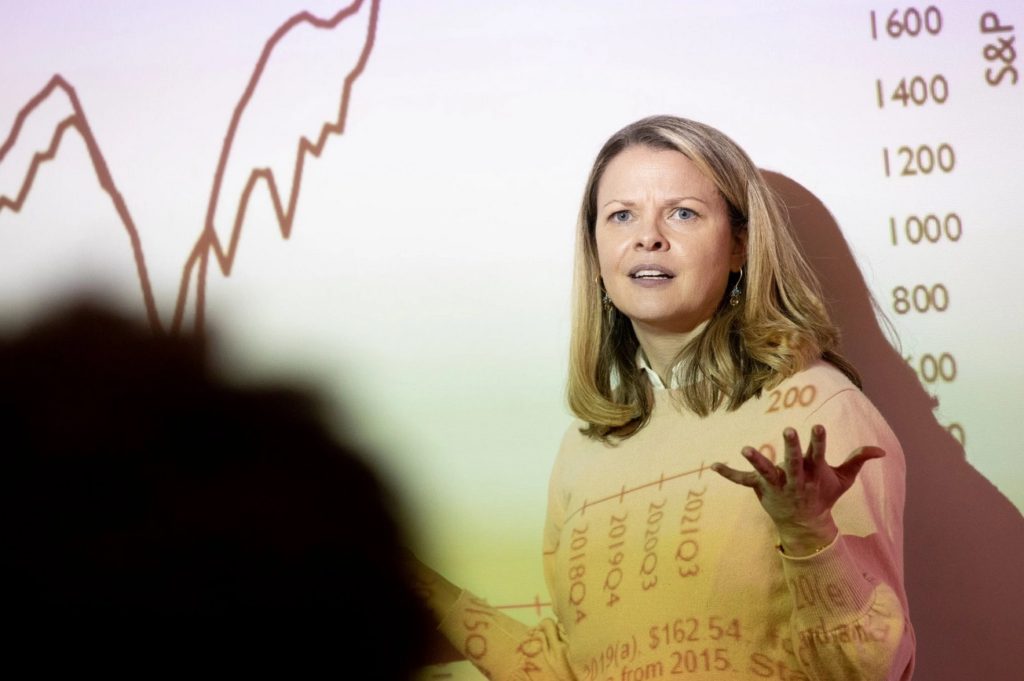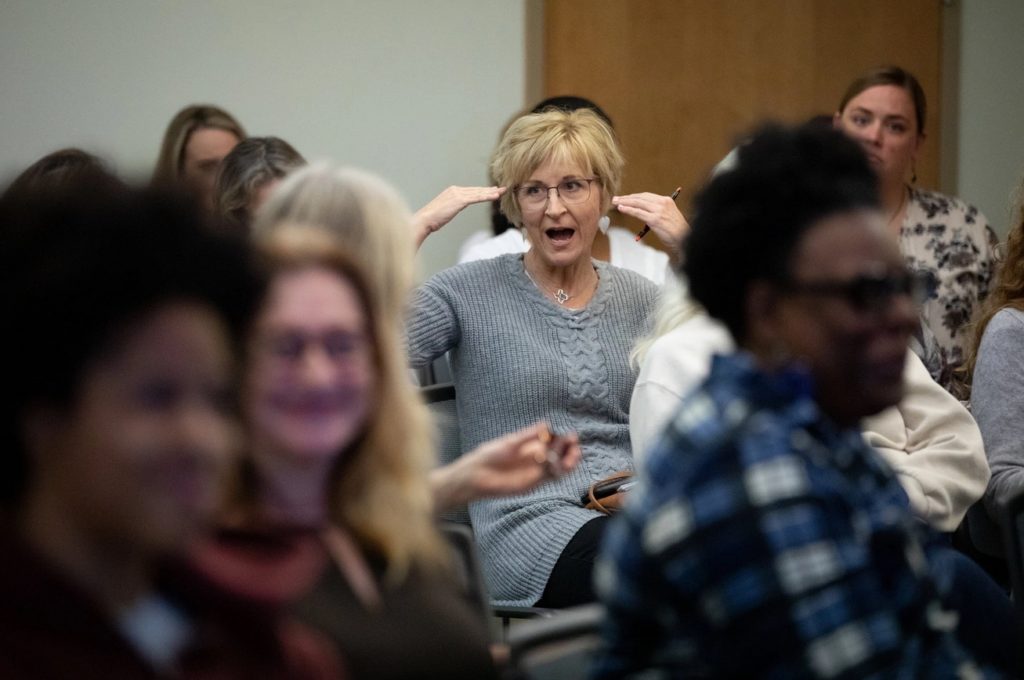Traditional financial channels, women say, have often been blind to their needs. Meetup groups and other organizations are filling a void.

April 24, 2020
By JOSHUA BROCKMAN
During the 2008 financial crisis, Lauren Winfield found herself starting over in Austin, Texas, without a job, a network or a nest egg.
She had just come out as gay. In her 20s with no savings or financial support from her family, she worked minimum-wage jobs to pay off college loans and credit card debt.
Ms. Winfield tried to save, but emergencies often washed those attempts away. The result: a feeling of insecurity that left her reluctant to try investing.
Things changed when Ms. Winfield started attending women’s finance group meetings. She eventually joined the Austin Women’s Investing Group, which she found on Meetup, and started connecting with its members on Facebook. The community she found in the groups gave her the support to begin investing for retirement in her 30s.
“It’s confidence boosting to be in the same room or online group as other women claiming their power and autonomy with their money,” said Ms. Winfield, now 34. She went on to create Signum City, a fintech start-up that developed an app-based game to help young adults learn to invest.
Her financial journey mirrors the challenges many women face when investing for retirement: Their short-term financial needs have a way of eclipsing long-term goals. Across the country, women’s investing groups, from Meetup to clubs organized by the nonprofit BetterInvesting, are helping some women to focus on their finances in ways, their members say, where Wall Street firms, fund companies and financial advisers have fallen short.
Just 17 percent of women said planning for retirement was their top financial goal in a 2018 survey by Pimco, the Newport Beach, Calif., investment firm that manages $1.8 trillion for central banks, pension funds and financial advisers. Respondents ranked it behind goals like achieving financial stability, creating a wide-ranging financial plan and becoming financially independent.
Researchers cite myriad reasons, namely: Women’s longer life expectancy, lower wages, marital status, and responsibility for child care and caregiving. The challenge women often face is how to take a nest egg that is typically smaller than men’s and extend it to last their lifetime.
The disconnect between women’s priorities and what the financial services industry typically emphasizes — strategies to beat the market — is especially apparent when it comes to retirement. In Pimco’s survey, 72 percent of women, and 81 percent of millennial women, said the investing system was “set up to be confusing.” Women identified honesty, knowledge and transparency as the top values they sought in advisers and financial institutions.
Major financial institutions have taken note. Bank of America, Merrill Lynch, UBS and Fidelity are among a growing number that have built websites and issued reports to try to attract female investors. They’re competing with women-focused investment houses like Ellevest, a platform that uses human advisers and roboadviser technology. What’s at stake, according to the Bank of Montreal, is an estimated $22 trillion in personal wealth that women in the United States control.
Geoffrey Sanzenbacher, an associate professor of economics and a research fellow for the Center for Retirement Research at Boston College, said many such Wall Street initiatives were “just marketing.”
A 2019 study by the center noted that a typical woman who was approaching retirement had spent about half her adult life married. This didn’t ensure greater financial stability, however. Even though married women are in households with higher earnings and wealth, the study said, they’re less likely than single women to maintain their standard of living in retirement because nearly half of two-earner couples “tend to undersave in their retirement plans.”
If only one spouse has a 401(k), that spouse needs to “save even more,” said Dr. Sanzenbacher, a co-author of the study. Yet most people don’t do that, he added.
This is where women’s investment groups and clubs are making a difference.
After some time with the Austin group, Ms. Winfield opened Roth I.R.A.s to invest in exchange-traded funds and some real estate investment trusts. She encouraged her partner to maximize 401(k) contributions and taught her partner about emergency savings.
“As a lesbian, I constantly remind myself to claim a seat at a table that was not initially designed for me,” she said. “Finance is a male-dominated field, but saving for retirement is a must for everyone.”
Monthly gatherings in public libraries, cafes, conference rooms or living rooms used to be the preferred way for women’s investment groups and clubs to meet. But now, because of the coronavirus pandemic, organizers are holding virtual meetings instead.
The Austin group stands out, in part, because it has built a membership of over 2,000. Sara Glakas, an investment adviser and the founder of Black Barn Financial, said she helped start the group in 2011 because women were being underserved by financial advisers with a “significant blind spot.”
Gathering together matters because the topic is stressful. “Much of the tone and approach of experts, along with the financial news you read, tends to cause anxiety for people,” Ms. Glakas, 40, said. “We seek to create simplicity, clarity and give people control.”
One recurring topic of discussion is how avoiding riskier parts of the financial markets, such as growth stocks and the technology sector, puts women at a disadvantage because they miss the effects of compounding.
“By focusing so much on the emergency fund and the mortgage paydown and the kids’ education, women are being steered into shorter-term, lower-return investments to the detriment of the longer-term, higher-return investments that can build great amounts of wealth,” Ms. Glakas said.
Kamie Zaracki, 64, who recently retired as chief executive of BetterInvesting, a national organization with a network of clubs that educate people about investing in high-quality growth stocks, has been making retirement contributions since her 20s.
“With every job since, I’ve participated in the 401(k) as soon as possible and immediately contributed the maximum amount,” she said.
Ms. Zaracki is single, lives in the Detroit area and for the last decade has consulted with a male chartered financial analyst to try to grow her retirement portfolio of stocks, E.T.F.s and bonds into a $2 million nest egg. But she also learned to find stocks to help increase her portfolio returns from participating in Baker’s Dozen, a BetterInvesting club with mostly female members that meets monthly in Milford, Mich.
Through February, Ms. Zaracki held a high percentage of equities (nearly 87 percent) in her retirement accounts, she said. Now, with the downturn, she and her adviser decided to sell some stocks so she could cover three years of living expenses.
About half of the women in the Pimco survey said they were so strapped for time that they felt “more time-poor than financially poor” — and preferred to hire someone else to manage their money. But Ms. Zaracki said managing investments didn’t have to take a lot of time.
Even with help, the hours she spends on it are “very empowering,” she said. “I have a clear picture of my finances and greater confidence in my financial decisions.”

Investor confidence remains in short supply with the coronavirus pandemic wreaking havoc on the markets. Laura LaTourette, who runs Family Wealth Management Group in Dahlonega, Ga., has fielded lots of calls from worried clients, many of whom are in the L.G.B.T.Q. community and older than 50. She is also concerned about her wife’s and her own portfolios.
Ms. LaTourette has run up against some of the same obstacles to money management that other women have — even though she is a financial planner.
“I am now just starting to really prioritize my own retirement savings,” said Ms. LaTourette, 59, who manages her own Roth I.R.A. and 401(k) accounts. “After living through the last recession, getting my children through college and helping my siblings with financial trouble, I find myself behind on investable assets for retirement.”
She said that she had come to appreciate how female clients valued “deep conversations” to learn about all facets of investing and the economy, and that she believed the industry needed to hire more women.
That’s the approach that Sallie Krawcheck, a co-founder and the chief executive of Ellevest, took.
“We have built Ellevest completely around serving women,” she said. Most of its clients — Ms. Krawcheck said they numbered in the “multiple tens of thousands” — are women, as are more than 70 percent of the company’s employees. This strategy “helped us see both the problem and solution from a vantage point that others have not,” Ms. Krawcheck said.
Ellevest’s platform has what Ms. Krawcheck called a “gender aware” algorithm that accounts for how women live six to eight years longer than men, often have lower earnings (with salaries that peak earlier) and take more career breaks. She said it was designed to “take on the least amount of risk necessary for women to reach their investment goals.”
The firm’s research also underscores the need for community engagement. “If you bring up the topic of money to a woman,” Ms. Krawcheck said, “the words that come to mind for her are ‘isolation,’ ‘uncertainty’ and ‘loneliness.’”
Those are exactly the feelings the Austin group is trying to help women avoid. “Frankly, I believe we have yet to see what women investors can achieve as a force,” Ms. Glakas said. “We’re very serious about creating a space for that change.”
Read original article, which appeared on Page B7.
© The New York Times Company
